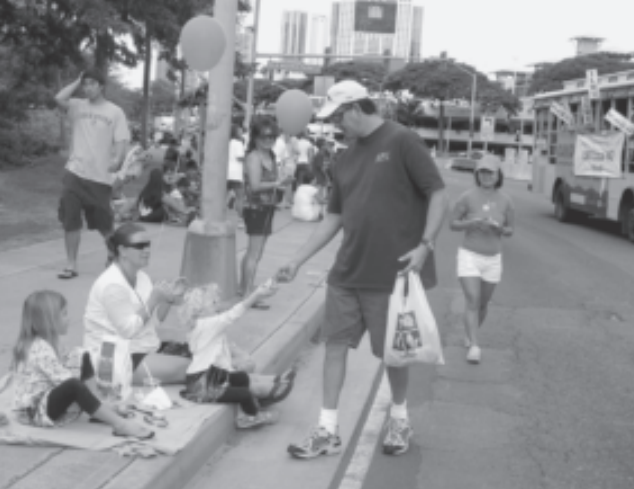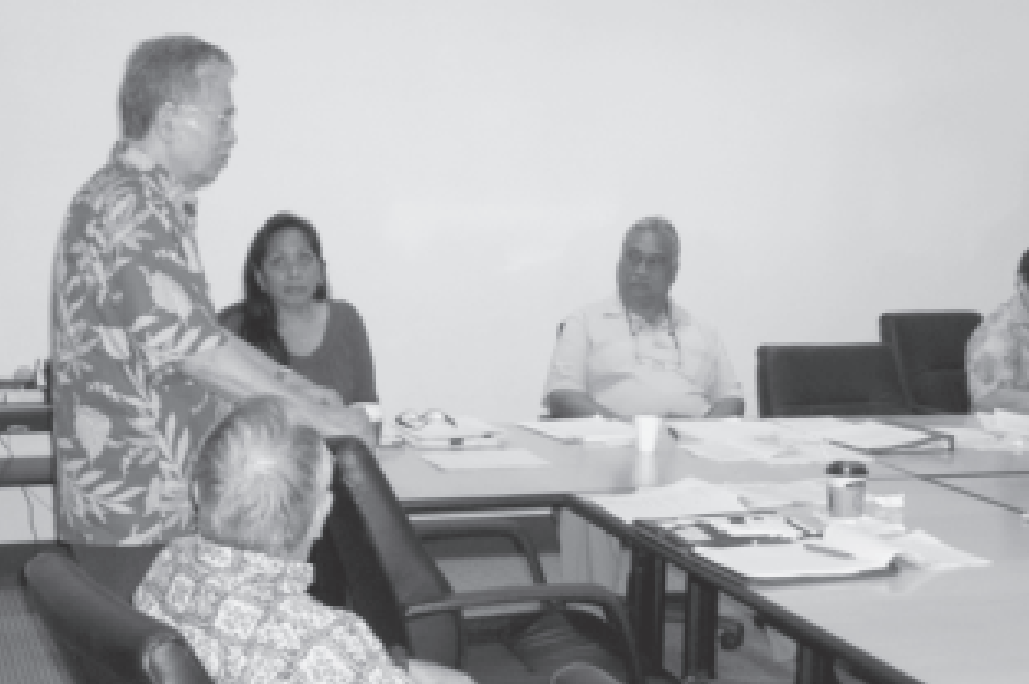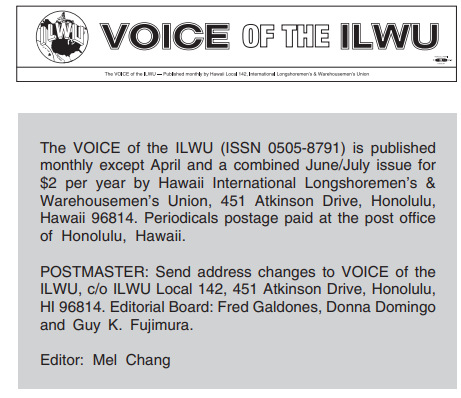
On Martin Luther King Day, January 18, 2010, Americans are urged to spend the holiday in a day of service to their community. On Oahu, the ILWU marched in a parade through Waikiki with a message of peace and justice.

Business Agent Karl Lindo and office worker Jenn Alviar pass out lollipops with a message in English and Japanese to Boycott the Pacific Beach Hotel. The trolley on the right is filled with retirees waving ILWU signs.
Senator Akaka meets with Local Executive Committee
U.S. Senator Daniel Akaka met with the ILWU’s Local Executive Committee on January 11, 2010, to brief them on some of the major developments in Washington D.C.
Akaka told the Committee that President Obama has brought a new style of leadership to the White House that reflects Obama’s roots in Hawaii. “You know he’s from Hawaii.” Akaka explained how Obama has appointed a very ethnically diverse group of people to leadership positions. Obama is also more informal, putting together teams instead of forming commissions. The teams get the job done faster, because Obama sets time frames for the completion of their work.
“We’re very busy in the Senate, working on a number of important programs.” Akaka mentioned national health care reform and the funding for Honolulu’s rail transit as some of the important issues.
The Local Executive Committee meets monthly and is made up of the union’s top officers—President Isaac Fiesta, Jr, Vice-President Donna Domingo, Secretary-Treasurer Guy Fujimura, and the five Division Directors—Richard Baker, Jr, William Kennison, Michael Machado, Dave Mori, and Nate Lum.

2010 ILWU legislative priorities
Six high priority issues will guide the work of the ILWU during the 2010 Legislative Session.
1. Worker Retention. The union will continue to work for legislation to protect jobs and employment when companies are purchased, ownership or management changes, a lease is transferred, or assets are sold or transferred and the business operation continues in a similar manner as under the previous owner or management.
2. Workers Compensation. The ILWU will work to maintain the existing “presumption clause” in the Workersí Compensation law which “presumes” an injury is work related unless the employer can prove the injury or illness is not because of their work.
The union will continue to support improvements in the law requiring timely payments of benefits when a claim is made, prevent benefits from being cut while a claim is being investigated or under appeal, and require insurance companies to pay the cost of an appeal when they deny a worker’s claim and the worker later wins the claim in the appeal.
The ILWU will work to address the problem of physicians declining to treat workers compensation cases because of cost or paperwork. The union will also work to create a panel of medical providers from which the injured worker and insurer can select a physician when insurers want an Independent Medical Examination of the injured worker. Presently, insurance companies tend to select from a group of physicians who appear to favor the insurers and underestimate a worker’s disabilities. Creating a panel of physicians would help eliminate this unfair practice.
3. Strong support for harbor development throughout the State of Hawaii, based on the priorities established by the Hawaii Harbor Users Group. Waterfront development must prioritize the need to provide for growing manifested cargo operations and not compromise safe working conditions for the employees.
4. Strong support for senior citizens’ programs. Maintain existing programs and oppose the state cutting funds to senior programs in efforts to balance the state’s budget.
5. Oppose the State “taking” the county share of the Transient Accommodations Tax (TAT). Presently, the counties get a share of the tax which they use to maintain county facilities and programs. Taking the counties share of the tax to balance the state’s budget would create hardship for the counties and could hurt the tourism industry on the Neighbor Islands.
6. Oppose the State “taking” the rail tax of 0.5% added to the general excise tax for the City and County of Honolulu. The rail tax was adopted to fund the rail system and the state should not attempt to balance its budget by taking the tax.


